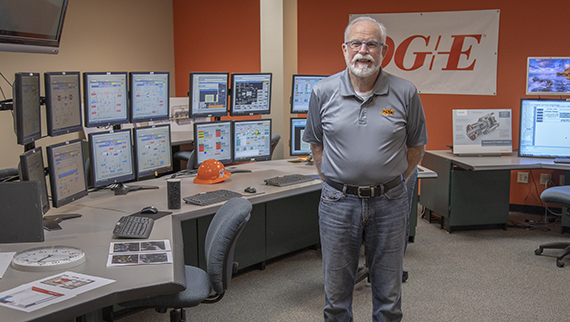
The OSU Institute of Technology School of Engineering & Construction Technologies received a $300,000 grant to enhance the Power Plant Technology curriculum.
The grant, awarded by the National Science Foundation – Advanced Technological Education, will help OSUIT students gain more experience with power plant systems and equipment before entering the workforce.
Bob Pope, Power Plant instructor and co-principal investigator on the project, is taking the lead on organizing the project and bringing Jeff Cushing, assistant dean of the School of Engineering & Construction Technologies and new PI on the project, up to speed.
"Integrating training on advanced technology into the curriculum and transitioning several face-to-face courses to an online or blended format will allow students to complete their degree more quickly and cast a wider net," said Pope. "This will allow students who aren't able to come to campus to take courses online-- which, as we see, is especially important right now."
The NSF-ATE grant amount is $300,000 for three years, beginning July 1, 2020, through June 30, 2023.
The first objective of the grant is to develop interactive media that enhances Power Plant Technology course materials, support the OG&E simulator donation and improve the access of teaching material with an online presentation. An instructional designer will also be hired in spring 2021 to assist with developing the simulator curriculum.
"Concerning the simulator, we have screens that represent and control equipment outside of the simulator," said Pope. "In a sense, we only have half the story with just the screens. We want to use the grant to teach students how to interact with the equipment on the other side of the control room."
The second objective is to gather industry representation and interested parties to design a strategic plan that enables the power plant program to best inform, attract and facilitate underrepresented student populations to attend OSUIT and successfully start their careers. This strategic plan will also be used by industry-partners to increase the diversity among their employees and improve internal inclusivity.
Anna Dinsmore-Hearn said that it feels "amazing" to have received the grant. "So much time, effort and hard work went into developing the proposal. It was satisfying to know that all our hard work paid off, and we successfully obtained a NSF-ATE award for OSUIT."
From conception to award, the process of obtaining the grant took a little over a year. The original team, which consisted of Pope, Dinsmore-Hearn and Terry Hanzel, former Power Plant instructor, met weekly and had monthly calls with mentors.
In 2018, the team was accepted into a grant-sponsored, leadership development mentorship program titled Mentor-Connect and began attending workshops to write the final grant submission.
"The mentorship was valuable because it added a level of knowledge about NSF-ATE and the process of submitting a proposal that we otherwise would not have known," said Dinsmore-Hearn. "It also clarified just exactly what we needed to do so we could stay on track. The mentors' experience and background helped us clarify our goals and description that gave the proposal the best chance at winning."
The Small Projects New to ATE Grant is an entry-level grant for NSF-ATE. Many colleges started on this path and have progressed to larger grants that involve the formation of centers of research and technology development, educational resource depositories and partnerships public, private and industry that attract new companies and industries to the area.
Pope said that a future goal is to apply for additional NSF-ATE funding through another tract. This could provide additional funds to implement further and redesign the Power Plant Technology course material to meet industry and technology's changing needs better.
